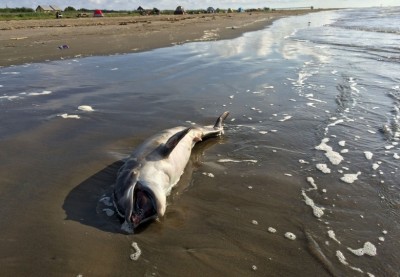New Study Confirms BP Linked To Dolphin Deaths in Gulf of Mexico

A new study published in the peer-reviewed online journal PLOS ONE hypothesizes that dolphins are dying in mass directly because of BP’s 2010 Deepwater Horizon oil spill. Though BP denies the validity of the scientific data, it indicates that impairment caused by the toxic oil is causing widespread death in the bottlenose dolphin population.
The study was conducted from June 2010 to December 2012 on 46 dead dolphins that stranded near Louisiana, Mississippi or Alabama. 22 were from Barataria Bay, the hardest hit area in the spill. All were labeled UME dolphins (unusual mortality event). They were studied in reference to deceased dolphins from a separate region that was not exposed to oil.
Lead researcher, veterinary pathologist Kathleen Colegrove, said,
“We found that dolphins that stranded and died after the oil spill were more likely to have distinct adrenal gland and lung abnormalities compared to other dolphins that were not exposed to oil. These abnormalities, importantly, are very consistent with abnormalities that have been seen in other animals following petroleum oil exposure.”
Though the study examined various systems and organs, the most significant differences between subject and control dolphins were in the lungs, adrenal glands, and lymphoid system.
Whereas 7% of reference dolphins presented a thin cortical lining of the adrenal gland (adrenal cortical atrophy), 33% of UME dolphins did. 50% of Barataria Bay dolphins displayed this disorder. The researchers noted that to their knowledge, adrenal cortical atrophy had not previously been found in free-range cetaceans.
The study explained that death was likely caused directly by:
“1) affected adrenal gland cortices, causing chronic adrenal insufficiency, 2) increased susceptibility to life-threatening adrenal crises, especially when challenged with pregnancy, cold temperatures, and infections, and 3) increased susceptibility to primary bacterial pneumonia, possibly due to inhalation injury, aspiration of oil, or perturbations in immune function.”
As Stephanie Venn-Watson, veterinary epidemiologist at the National Marine Mammal Foundation and lead author of the study clarified,
“Animals with adrenal insufficiency are less able to cope with additional stressors in their everyday lives…and when those stressors occur, they are more likely to die.”
Further, Colegrove remarked that
“These dolphins had some of the most severe lung lesions I have seen in the over 13 years that I have been examining dead dolphin tissues from throughout the United States.”
The lesions are caused by severe pneumonia, which according to the study, was often caught because of adrenal cortical atrophy.
Additionally, the analysis found that “UME dolphins had a higher prevalence of lymphoid depletion in either or both the spleen or lymph node than reference dolphins.”
The researchers acknowledged that there could have been other causes of death among the UME dolphins, including “combined oil exposure, an unusually cold winter during 2011, and fresh water infusions.”
Nevertheless, the study concluded that “… contaminants from the DWH oil spill contributed to the high numbers of dolphin deaths within this oil spill’s footprint during the northern GoM UME following the DWH oil spill.”
Though BP was ordered to pay a $13.5 billion fine (less than expected) as punishment, the sum amounts to the cost of doing business with a government that creates hegemonic systems of oppression by colluding with corporations. The fine parallels the futility of recent DOJ fines on big banks that perpetrated the financial collapse. In spite of billions of dollars in slaps on the wrist, the corporations forced to pay maintain full power.
Naturally, BP refused to accept responsibility for the spill’s effects on dolphins—in spite of the fact that the Deepwater Horizon oil spill was the largest in history. The 200 million gallon spill endangered countless animalsand still pollutes the region. Even so, BP said last week that
“The data we have seen thus far, including the new study from NOAA, do not show that oil from the Deepwater Horizon accident caused an increase in dolphin mortality.”
The study was funded by the National Oceanic and Atmospheric Administration and “other federal and state trustees,” but it was also funded by BP itself. In response to BP’s statement, Colegrove stressed a rigorous peer-review process.
Whether or not BP admits it, dolphins in the Gulf of Mexico continue to suffer the harmful effects of the company’s disaster. As other marine animals also struggle to survive, it is time to hold the perpetrators accountable not only financially, but by lessening the power the corporation wields over the system..

